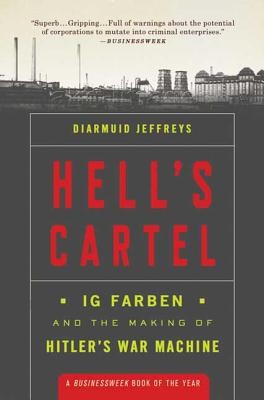
- We will send in 10–14 business days.
- Author: Diarmuid Jeffreys
- Publisher: St. Martins Press-3PL
- ISBN-10: 0805091432
- ISBN-13: 9780805091434
- Format: 15.2 x 22.6 x 3.3 cm, softcover
- Language: English
- SAVE -10% with code: EXTRA
Reviews
Description
A damning new history . . .Jeffreys brings a rare combination of forensic acumen and narrative flair. --Chicago Tribune
At its peak in the 1930s, the German chemical conglomerate IG Farben was one of the most powerful corporations in the world. To this day, companies formerly part of the Farben cartel--the aspirin maker Bayer, the graphics supplier Agfa, the plastics giant BASF--continue to play key roles in the global market. IG Farben itself, however, is remembered mostly for its infamous connections to the Nazi Party and its complicity in the atrocities of the Holocaust. After the war, Farben's leaders were tried for crimes that included mass murder and exploitation of slave labor. In Hell's Cartel, Diarmuid Jeffreys presents the first comprehensive account of IG Farben's rise and fall, tracing the enterprise from its nineteenth-century origins, when the discovery of synthetic dyes gave rise to a vibrant new industry, through the upheavals of the Great War era, and on to the company's fateful role in World War II. Named one of the best books of the year by Business Week, Hell's Cartel sheds new light on the codependence of industry and the Third Reich, and offers a timely warning against the dangerous merger of politics and the pursuit of profit.EXTRA 10 % discount with code: EXTRA
The promotion ends in 17d.23:46:21
The discount code is valid when purchasing from 10 €. Discounts do not stack.
- Author: Diarmuid Jeffreys
- Publisher: St. Martins Press-3PL
- ISBN-10: 0805091432
- ISBN-13: 9780805091434
- Format: 15.2 x 22.6 x 3.3 cm, softcover
- Language: English English
A damning new history . . .Jeffreys brings a rare combination of forensic acumen and narrative flair. --Chicago Tribune
At its peak in the 1930s, the German chemical conglomerate IG Farben was one of the most powerful corporations in the world. To this day, companies formerly part of the Farben cartel--the aspirin maker Bayer, the graphics supplier Agfa, the plastics giant BASF--continue to play key roles in the global market. IG Farben itself, however, is remembered mostly for its infamous connections to the Nazi Party and its complicity in the atrocities of the Holocaust. After the war, Farben's leaders were tried for crimes that included mass murder and exploitation of slave labor. In Hell's Cartel, Diarmuid Jeffreys presents the first comprehensive account of IG Farben's rise and fall, tracing the enterprise from its nineteenth-century origins, when the discovery of synthetic dyes gave rise to a vibrant new industry, through the upheavals of the Great War era, and on to the company's fateful role in World War II. Named one of the best books of the year by Business Week, Hell's Cartel sheds new light on the codependence of industry and the Third Reich, and offers a timely warning against the dangerous merger of politics and the pursuit of profit.

Reviews